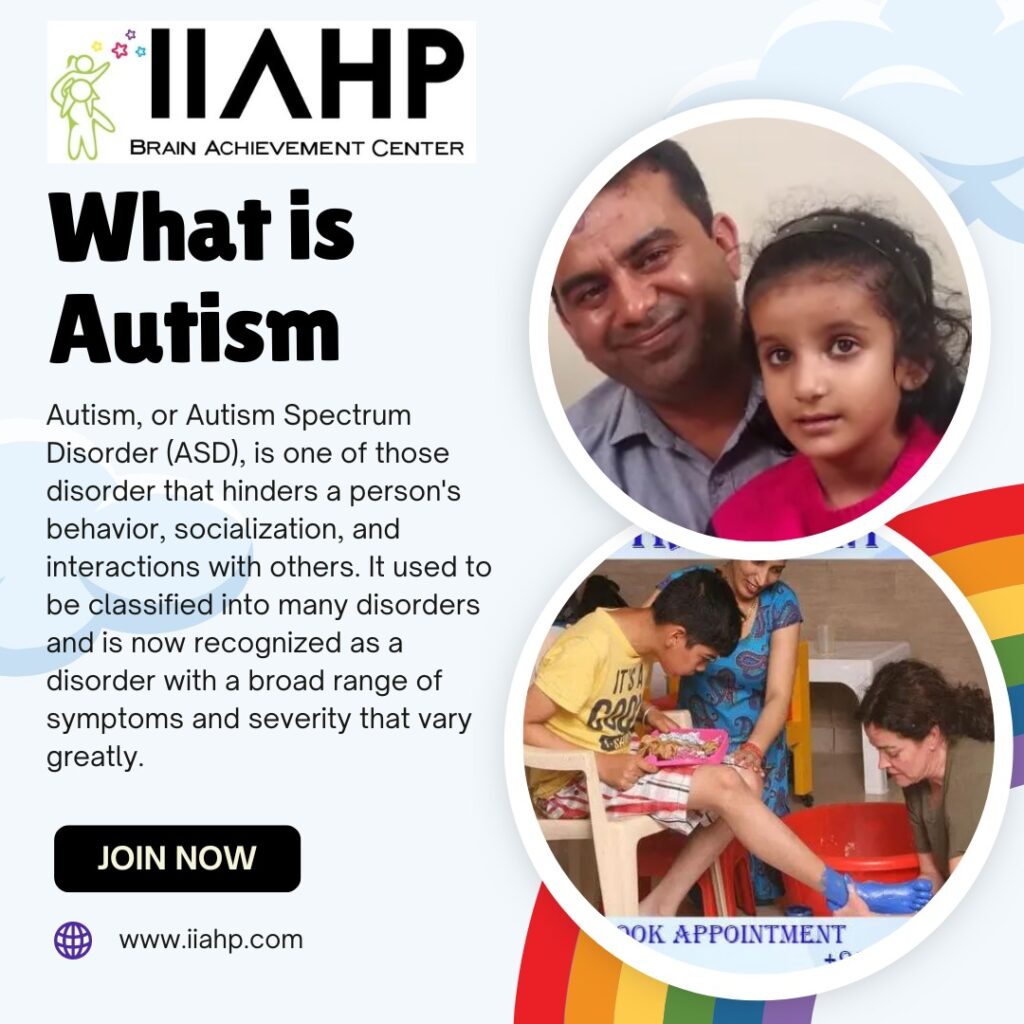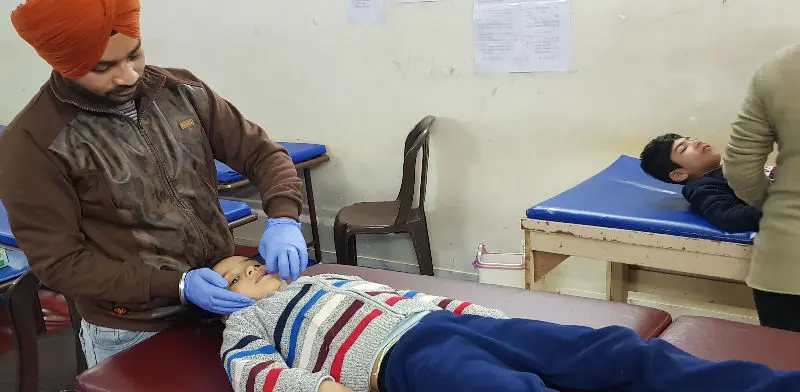Autism, or Autism Spectrum Disorder (ASD), is one of those disorder that hinders a person’s behavior, socialization, and interactions with others. It used to be classified into many disorders and is now recognized as a disorder with a broad range of symptoms and severity that vary greatly. This blog is about Autism Signs and Symptoms Treatment.
Although it is now known as autism spectrum disorder, many individuals still use the name “autism.” There is no cure for autism, but currently, there are numerous treatments for autism that can help improve social functioning, learning, and quality of life for both children and adults diagnosed with Autism. If these interventions are started when the child is small, it can lead to a nearly full recovery from Autism.
In some instances, people may not require any assistance to help them with their day-to-day chores, but some may require extensive therapy and care. It’s also worth noting that much of the research on autism assistance is geared toward youngsters. This is largely due to previous studies, which support the fact that autism treatment can be more fruitful when started early and many of the options intended for children might benefit adults as well. At IIAHP, with our interventions for Autism Treatment, all children are improving, most with leaps and bounds, and with many reaching full recovery and becoming fully well and going to regular schools and playgrounds.
Signs of Autism to Look For
During regular checkups, your child’s doctor will look for signs of developmental delays. If your child shows any signs of autism spectrum disorder, you will likely be encouraged to consult a specialist who treats autism in children, such as a child psychiatrist or psychologist, pediatric neurologist, or developmental pediatrician, for an evaluation.
There isn’t a single standard treatment for autism spectrum disorder (ASD) because of wide variations in the degree of symptoms, making the diagnosis difficult. There isn’t a specific medical test that helps determine the disorder. Instead, a specialist may:
- Examine your child and check their social and communication abilities and personality
- Test your child for hearing, speech, language, and developmental levels, along with social and behavioral concerns.
- Give your child organized social and communication tasks to do and check for results.
- Refer to the American Psychiatric Association’s Diagnostic and Statistical Manual of Mental Disorders (DSM-5) for criteria.
- Involve more experts in diagnosis-making if needed.
- Suggest genetic testing to find out if your child has a hereditary condition such as fragile syndrome or Rett syndrome.
Because ASD symptoms often overlap with those of other diseases, such as Attention Deficit Hyperactivity Disorder (ADHD), therapy should be tailored to the individual’s requirements. Autistic therapies benefit many individuals diagnosed with ASD, regardless of their age at the time of diagnosis and their ability levels, and can often benefit it.
There are numerous treatment methods for autism to help reduce the symptoms while increasing abilities. The most successful therapy and approaches vary depending on the individual’s needs. Yet, most persons with ASD benefit from organized and specialized programs. In many cases, it has been observed that treatments can significantly lessen autism symptoms and assist people with autism with daily tasks. According to research, early diagnosis and therapies, such as those provided in preschool or earlier, are more likely to have a significant favorable impact on symptoms.
Types of Treatments for Autism
While research is being done, to find methods and ways to treat autism, there isn’t one treatment that works for everyone, each treatment plan is customized based on the needs of the patient to minimize difficulties and promote learning and growth in your child.
The range of home and school-based treatments available might be daunting, and your child’s requirements might evolve over time. If your child has been diagnosed with autism, consult specialists about developing a plan of care and assembling a group of specialists who can assist you in meeting your child’s needs.
Autism Treatment options may include:
- Behavior and communication therapies: These treatment programs for autism target the variety of behavioral, linguistic, and social challenges linked to autism spectrum condition. Here they concentrate on teaching new skills and minimizing harmful behaviors in autistic individuals.
- Educational therapies: Highly organized educational courses frequently benefit those who have autism spectrum disorder. Several exercises aimed at enhancing behavior, relationships, and social abilities are usually combined with a team of experts in effective programs.
- Occupational Therapy: Occupational therapists assist youngsters with a wide range of developmental problems. Many have a diverse set of abilities and expertise that enables them to work on sensory issues, interactive play skills, collaborative engagement, and much more.
- Speech Therapy: We provide advanced speech therapy that includes logotherapy and Ora-facial therapies. We are very successful in improving speech in children with Autism.
- Physical Therapy (PT): While it might not seem evident initially why a child with autism would require physical therapy when treating autism, many autistic individuals have low muscle tone as well as impaired motor skills and coordination. Physical therapists can assist kids in developing the skills necessary to participate in physical games by working with them in a natural setting like a playground or gym.
- Art Therapy: Hundreds of different materials are used in Art therapy for sensory integration
- Reading, Maths Program: Our reading and Maths program has 100% success in enabling our children to start to read and do maths.
- Auditory Integration: Our listening program improves upon the auditory issues thereby helping nonverbal children to start speaking and oversensitive children to be able to work conductively in their environment.
- Reflex Integration: Reflex Integration techniques work to mature and integrate the primitive reflexes. So the primitive reflexes slowly disappear.
- Prism and Vision Therapy: Prism Therapy uses Prisms with a Balance Board and Brain Gym Activities to improve the Vestibular system, thereby leading to improved vision, eye coordination, and eye contact. Even squint is cured with this. Vision Program helps to normalize the focal as well as peripheral vision. Eyes convergence improves leading to better vision and even total cure of the squint (without surgery).
- Brain Gym and Balance Board Therapy: Works to integrate the brain and connects different parts of the brain well, thereby improving brain function and putting the child back on the path to wellness. Balance Board works to improve the vestibular and proprioceptive system of the child, thereby making the child feel more grounded and agile, thereby reducing repetitive behaviors.
- Music Therapy: Music Therapy works to improve hand, eye, auditory coordination, rhythm, sequencing, and motor coordination. Also works to connect the left and right hemispheres of the brain.
- Medications: We do not recommend giving Psychiatric drugs to children with Autism, as for most children their Psychotic symptoms go away with interventions at IIAHP. We believe Autism is the problem of a disconnected nervous system, which manifests as psychotic symptoms. So the underlying cause is the disorganized brain and giving psychotic drugs would only suppress symptoms. We do recommend homeopathy, as it helps the child to be more healthy physically and physiologically, and also makes the nervous system more ready for improvement
Treating Autism with Alternative Remedies

People search for numerous methods for treating autism. Still, there isn’t much evidence to support these treatment methods, and their efficacy is highly disputed. There are also some other approaches that might be worse than helpful. Many children do improve with chelation, but it has limited effect.
Despite this, autism is a broad disorder with many different signs. A treatment’s ineffectiveness for one individual does not always imply that it will be ineffective for another. If you are a guardian or parent, you can thoroughly collaborate with a doctor to investigate different options. A good doctor can guide you through the literature on these choices and steer clear of possibly dangerous approaches unsupported by evidence.
Planning Ahead
Autism is a complicated disorder with no known cure. fortunately are several therapy options and medications that may assist in minimizing the signs and symptoms of autism. Individuals with autism spectrum disorder often learn and adjust to issues at every step of their lives, but the majority will always need some amount of help. Organizing your future options, such as work, university, living arrangements, and support services, can help make the process go more smoothly.






